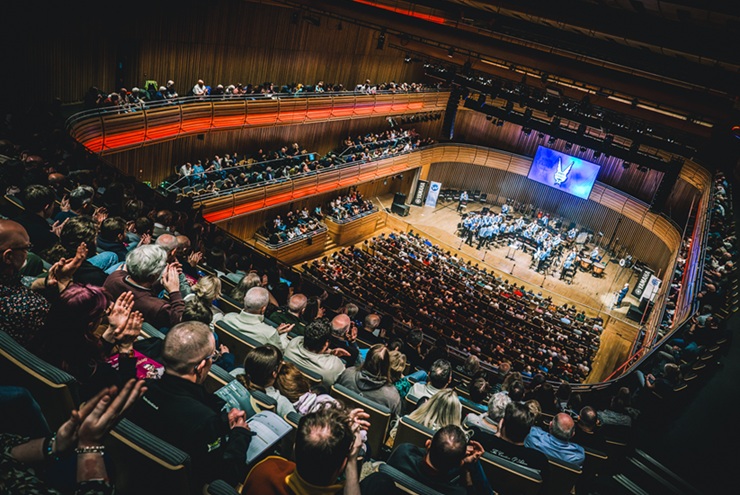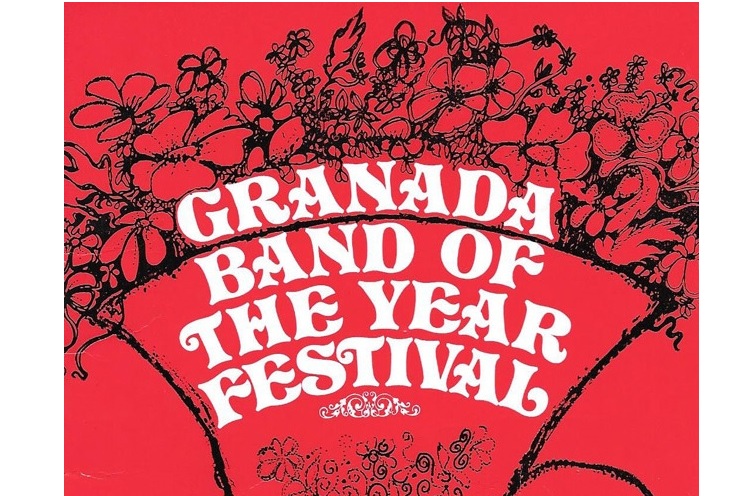
To deliberately misquote Maximus Decimus Meridius, Commander of the Armies of the North, General of the Felix Legions and the star to the amphitheatre masses of the ancient Roman world.
“Are you not entertained?”
Positive response
The gladiatorial leader of his own band of virtuosic performers could well have been addressing the pre-results audience at The Glasshouse International Centre for Music in Gateshead this year.
However, after a Brass in Concert era increasingly shaped by presentational theatricality rather than musical substance, his question would surely have found a positive response thanks to the approach of fellow competitors rather than any thumbs-up decree of the organisers – although one may still be needed.
his question would surely have found a positive response thanks to the approach of fellow competitors rather than any thumbs-up decree of the organisers
Critics have long argued that the 2014 change in the BIC marking system heralded a conscious ‘tick-box’ mentality from bands - one that rewarded contrived programming designed to meet the category marking criteria rather than the event’s own mission statement ambition.
Risk aversion
Perhaps so, but as a result it may well have simply become a reflection of its own success in highlighting the requirements to build a potential title-winning set - calculated creativity offset by risk aversion.
Perhaps so, but as a result it may well have simply become a reflection of its own success in highlighting the requirements to build a potential title-winning set - calculated creativity offset by risk aversion.
However, it also meant that without a substantive performer-led reappraisal, a contest “designed to appeal to both the general listener and aficionados of the discipline”, was far from also being “free of artistic restriction”.
It had become a numbers game - but also one that has now its seems, finally initiated a change of competitive outlook.

BIC vox populi came on mass
Full House
And whilst the vox populi audience emphatically ensured ‘full house’ signs were posted a week before yet another very well-run event this year, few observers would disagree that a shift of programmatic outlook from the competitors has been somewhat overdue.
The sesterce, let alone the penny, may have finally dropped.
Copycat designs
Looking back, the inventiveness of Cory’s BIC winning programmes under Philip Harper from 2015 on, was remarkable.
Yet, with a couple of notable victorious exceptions (Eikanger 2017 and Brighouse in 2022 come to mind), it also saw bands set about imitating their thematic designs quicker than copycat Chinese toga manufacturers.

Colourful copies have been made of Cory's success
Flattery
It may well have been the ultimate form of flattery, but what once appeared to be an inexhaustible variant seam of creativity to exploit, has in recent years begun to offer fewer gems of originally produced musical inspiration – even for Cory.
what once appeared to be an inexhaustible variant seam of creativity to exploit, has in recent years begun to offer fewer gems of originally produced musical inspiration
It perhaps explains why the cooperation band’s victory this year was welcomed so warmly by an audience that has also become more appreciative of informed programming and risk-taking substance, rather than repetitive prescription and colourful ephemera.

Coco Chanel certainly entertained the audience...
Not alone
And not only were the Scots with their ‘La Premiere’ take on the opening night of Stravinsky’s ‘Rite of Spring’, the only band that struck a new balance – one subtly but significantly shifted between presentational theatrics and quality playing of substantive musical choices.
It did not go unnoticed either that the best also ‘threaded’ motifs and themes throughout their programmes (Brighouse and Flowers in particular), rather than bolting them together as tenuous links between items, whilst the multi-media added to, rather than distracted from what was actually being performed - including a quite brilliant effort from the Dutch of Brass Band Schoonhoven.

There was certainly something different from the Dutch...
Sustainability
Bands are evidently still investing a great deal of hard earned cash in their music commissions and presentations, but it was also apparent that in an age of sustainability and repurposing, the ‘arms-race’ of immediate post-contest obsolescence has been significantly reduced.
There was certainly more subtle variety for the judges to consider - perhaps accounting for the wider variance in individual marks.
Why it has occurred is hard to pinpoint (there is long standing dialogue between the competitors and the organisers each year), but there is no doubt that at the very top end of things it certainly has.
There was certainly more subtle variety for the judges to consider - perhaps accounting for the wider variance in individual marks.

BIC CEO, Nigel Stevens and his team have established a long standing dialogue with competing bands
Arguably then, this year there was something about things that had more in common with an event broadcast to a worldwide audience when Russell Crowe was a mere Centurion in the gladiatorial entertainment ranks – and one that perhaps may also add to the positive answer to his Maximus question.
Purpose
Granada Band of the Year also had an ethos – or ‘purpose’ as founder Bram Gay described it in his introduction to the inaugural 1971 contest.
That he said, was for bands to produce, “a programme for TV presentation at a peak period, taking into account the need to retain the audience while promoting the brass band as a medium not only of entertainment but of musical communication”.
They also had to show that they were, “capable of offering to the public through the medium of television a valuable and entertaining musical experience.”

Purpose to the ethos - in 1971
Holistic approach
The marking system used was simplistic, but in many ways retained a sophistication in its holistic approach - asking the judges to be fully aware of what it meant in reality to the understanding of a much wider audience.
And that is perhaps where we have now reached at Brass in Concert (replace television with the record numbers watching on wobplay). A new system, or at least a reappraisal of the current one is now just as overdue as the musical approach was of the competing bands.
A new system, or at least a reappraisal of the current one is now just as overdue as the musical approach was of the competing bands.
Reflection rather than endorsement
Although anecdotal, the overwhelming majority of the audience we spoke to, said that they saw the eventual result, and not the way it was constructed, as being more of a general reflection, rather than a forensically analysed endorsement of their personal tastes.
Its intricacies held little interest. They had just been splendidly entertained.

The Audience Prize was won by Foden's
Audience prize
Interestingly, the award of the Audience Prize was once again claimed by a band that didn’t win overall (only twice since 2018 in fact), yet was there any major outcry from rivals?
To misquote another old Roman – the punters came, they saw and they headed home fully satisfied by their day’s entertainment.
Lack or tribal rivalry
If the welcome lack of tribal rivalry at the vibrant awards presentation (one of the event’s great successes when it comes to the results) is now anything to go by, even the performers find the minutiae of the current system increasingly irrelevant too (there is no small screen let alone big screen 'reveal').
They have moved things forward and the judges should be given the opportunity to do the same.
To them, it is the ‘free from restriction’ ethos that they feel should underpin the contest’s future outlook. They have moved things forward and the judges should be given the opportunity to do the same.

Forward desire
A complex, and not infallible (as was shown again this year) results process now seemingly only serves the purpose of reinforcing post-contest viewpoints and ingrained prejudices on the anomalies of numerical subjectivity - invariably negative from many who were not even at the event in the first place.
And that more than anything else was perhaps what was so significant about Brass in Concert this year – the desire shown to move the event forward (and the organisers have certainly done their part in many other ways) that has come from the positivity of the performers who take centre stage to entertain the masses.
Iwan Fox
Images: Thomas Jackson - Courtesy permission from http://www.tynesight.co.uk













